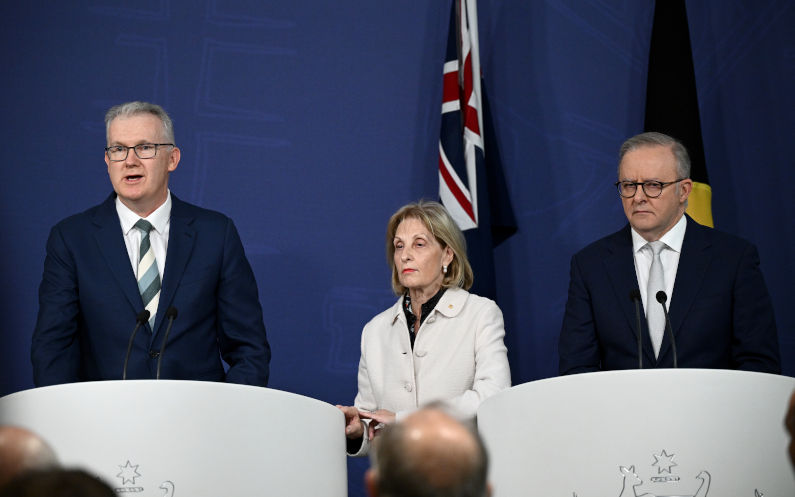Antisemitism Plan sparks fierce debate over free speech, racism, and political agendas
July 14, 2025
At a press conference in Sydney on Wednesday 10 July 2025, the Special Envoy to combat antisemitism, Jillian Segal, together with Prime Minister Anthony Albanese and Home Affairs Minister Tony Burke launched the National Action Plan to Combat Antisemitism in order to address antisemitic hate, especially in the wake of intensified community tensions following the war in Gaza.
Framed as a decisive response to the perception of rising tide of antisemitic incidents in Australia, the plan has instead ignited a storm of criticism from civil society groups, academics, and anti-racism advocates.
While the government stressed that the plan would uphold free expression —“not free hate”, as Burke put it — the rollout has been widely condemned for blurring the line between fighting antisemitism and suppressing legitimate dissent.
“If you have a view about the Netanyahu Government, express it. But don’t target someone because they are Jewish. That is criminal behaviour,” said Prime Minister Albanese.
However, many critics argue that the very premise of the plan risks criminalising precisely that distinction.
A plan rooted in controversy
The plan’s embrace of the International Holocaust Remembrance Alliance definition of antisemitism — a definition criticised for conflating criticism of Israel and Zionism with antisemitism — has drawn sharp rebuke.
The Jewish Council of Australia described the strategy as a blueprint for repression, not inclusion.
“This document reads more like a blueprint for silencing dissent rather than a strategy to build inclusion,” said Dr Max Kaiser, executive officer of the Council. “Antisemitism is real and must be taken seriously. But it does not exist in a vacuum. Any response that treats antisemitism as exceptional, while ignoring Islamophobia, anti-Palestinian racism, and other forms of hate, is doomed to fail.”
The Council warned that the plan’s vague language and punitive recommendations — such as stripping funding from universities, visa screening for ideological views, and intensified surveillance — mirror authoritarian tendencies seen in the US under Trump.
‘Authoritarianism dressed as anti-racism’
The Australia Palestine Advocacy Network delivered the most blistering critique, calling on the government to reject Segal’s proposal in full.
“This plan is not about fighting racism,” said APAN president Nasser Mashni. “It’s a state-backed tool to silence dissent, criminalise people who are speaking up against genocide and in solidarity with Palestine, and enforce political conformity.”
APAN characterised the timing of the plan — released during NAIDOC Week — as symbolically violent and indicative of a settler-colonial mindset.
The group accused the proposal of institutionalising “racialised surveillance”, singling out First Nations, Palestinian, Arab, and Muslim communities for ideological policing. Particularly concerning were recommendations for deporting non-citizens “involved in antisemitism” and screening visa applicants for ideological beliefs.
“Every person in this country should be angered by the reforms this plan proposes,” said Mashni. “It is a dangerous attack on free speech, a betrayal of anti-racism, and a direct assault on the rights and dignity of marginalised communities.”
Academic: Plan ignores ’elephant in the room’
Associate Professor Matteo Vergani, a leading hate-crime researcher at Deakin University, acknowledged the severity of antisemitic hate but questioned whether the plan’s sweeping scope would backfire.
“The document ignores the elephant in the room: whether the plan could be used to silence legitimate criticism of Israel,” Vergani said.
Vergani noted that even within Jewish communities, there is deep disagreement over how to apply the IHRA definition. He cautioned that regulating speech under the banner of antisemitism must be done with nuance to avoid creating an environment where political critique is censored.
“We don’t want to create an environment in which any criticism of a community or group is shut down by regulation. In a democracy, open and robust debate is essential.”
While the plan proposes measures across law enforcement, education, and media to combat hate, Vergani highlighted the need for intercommunal dialogue and trust-building, rather than authoritarian enforcement.
“The only real solution is building mutual understanding… knowing someone from another community breaks down stereotypes. Right now, that trust is eroding.”
The politics of definition and silence
The plan’s strongest defenders argue that Australia needs a comprehensive response to a documented rise in antisemitic incidents. Yet, the lack of clarity on implementation — especially concerning the most controversial recommendations — has only deepened fears that it will be weaponised against political opponents, particularly those advocating for Palestinian rights.
Both APAN and the Jewish Council of Australia have criticised the lack of consultation with diverse Jewish voices, particularly those critical of Israel’s policies.
“What this plan fundamentally misunderstands,” said Dr Kaiser, “is that safety for one group cannot come at the cost of democratic freedoms and the further marginalisation of others.”
A fork in the road for anti-racism in Australia
As the government now considers which recommendations to adopt, it faces a difficult crossroads: whether to double down on a security-focused, top-down approach, or to engage in genuine, inclusive anti-racism that addresses the full spectrum of hate — including Islamophobia, anti-Palestinian racism, and antisemitism —without playing one community against another.
The call from civil society is clear: fight hate without compromising freedom.
Whether the Albanese Government is listening remains to be seen.
Republished from AMUST, 11 July 2025
The views expressed in this article may or may not reflect those of Pearls and Irritations.


